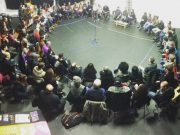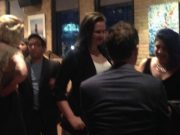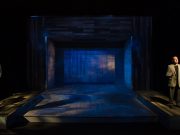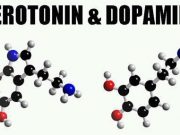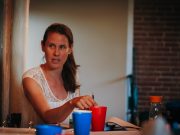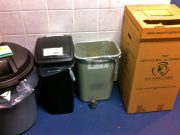#CDNTimes
Home #CDNTimes
How I Decided To Speak
I began reaching out to fellow Latino artists and researching the history of my ancestors. All this led to finally feeling as though I had earned the right to call myself a Latino. So when the issue surrounding the casting of The Motherfucker with the Hat presented itself I felt it was time to stand my ground and add my voice to the fray.
VancouverPlays Explained
Currently in its twelfth year, the site has logged over 1.2 million visitors and archived more than 600 reviews, 95% of them written by me. My approach to reviewing has not changed very much whether live on air for radio, in print for a newspaper, or online for my own site. The only real difference in reviewing for my own website is that I can write as much as I want and use words I couldn’t use on CBC or in the paper.
Criticism and Community
All of this indicates to me that the TTCAs are in a tight spot. Despite the genuine hope for change to come from membership, change SEEMS to be controlled by the hiring practices of a media industry struggling just as much as theatre to achieve gender equity. But to do nothing is to continue our annual ritual each June of the tweets and blog posts challenging the merit of a series of awards determined exclusively through the male gaze.
Artistic Director Writes to Critics – You Won’t Believe What Happens Next!
The local papers covered the hell out of the shows – but the reporters had no idea how to write a review. After complaining about this for a few years, I decided instead to look at my role in the equation. So, we hired a critic from Toronto to spend a weekend conducting a workshop for local writers.
An open letter to a community enraptured by open letters
Theatre, live performance, whatever it is we do, is like a village square. To extend the metaphor – an open letter is a fortress. It conceptualizes its statement and works to create barriers – or castle walls – to any disagreement. I don’t want to come to your castle to be lectured at – it’s pointy and cold. I’d rather live in the village square. And the reason? Because there, we talk.
Good and Never Good Enough
I grew up in a theatre that ignores people of colour, people with lived experience of disability and who live with labels or diagnoses. A theatre that minimizes or erases the narratives of people integral to the communities they call home. And then, for me, the hardest part of all: that despite 17 years of New Years resolutions, I still didn’t know how to be ‘good’.
You are not special
The world has become a funnel. Unless we approach our work and thoughts like the hermetic Unabomber then we will constantly discover how un-special we are... So what is my brilliant friend to do when I know they are brilliant but they discover that they are not brilliant enough to be first?
A watershed for discussion
As Annabel’s inquiry into water transmutes into an exposé of the deadlock we’ve reached between economic growth and environmental stewardship, it becomes clear that representing a range of viewpoints on this subject is going to be difficult, if not impossible. Both Annabel the writer and Annabel the character grapple with the devastating realization that whereas not all that long ago environmentalism was a bipartisan value, it has now become a divisive, even dirty word, in some circles.
Working with Generation Hot
This puts me in the awkward position of placing a goal on my artistic practice beyond ‘make good art.’ Awkward because art itself is not advocacy. To me, it becomes some other thing when the message is overt, the intention to persuade. Good art doesn’t tell people how to think or feel. It can invite us to think and feel for ourselves, into the darker corners, and past what we believe is possible. Like death, climate change is one of those big subjects that art can help us make emotional sense of, linking it to our own lives in a meaningful way.
Making change, one light bulb at a time
It’s been 2 ½ years since PTC moved into its current site, and created a theatre centre out of an abandoned pork roastery in Vancouver’s Chinatown. We’ve tried to implement green policies through our transition to this space, and in every day operations. We couldn’t afford a lot of high-end eco-products, so we have taken the “reduce and reuse” principles of the three R’s to heart.






